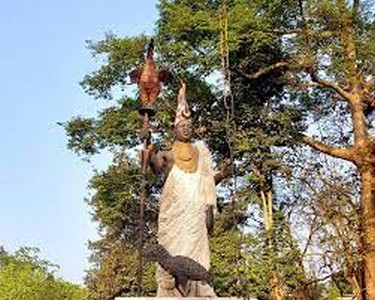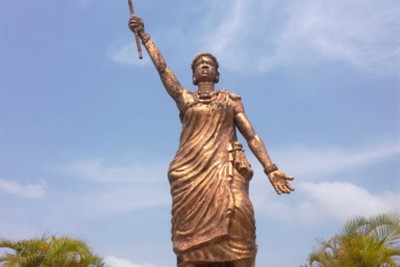Call us at (214) 906-2965
Call us at (214) 906-2965
As the founder of the Yoruba race, the name of Oduduwa signifies the power of the womb. Oduduwa also represents omnipotence, the ability to affect and reconstruct the physical reality at will. Oduduwa may also be translated as “the quintessence of behavior” (Odu-ti-o-da-Iwa) or "the reservoir of culture and manners" (Odu-ti-o-du-iwa)
The oral history of the Yorubas identifies Lamurudu as the father (baba) of Oduduwa. Lamurudu himself was an important prince in his homeland land to the east, regarded by some sources as being in Arabia, birthplace of Islam or in present day Ethiopia or southern Sudan.
Lamurudu, Oduduwa’s father was said to be a pagan whose position in his native land was threatened by the coming of the monotheistic religion, Islam, which swept through the Near East and North Africa at this time. Reputed to have been a very powerful hunter and warrior, Lamurudu was willing to travel a long distance across deserts and many rivers to bring his wives and children to a new land. But like the Biblical Moses, he was not destined to reach the ‘promised’ land. This lot fell to the youngest of his sons, who was Oduduwa.

“A certain number of deities came together at the behest of the Lord of the Skies, Olodumare, to create the earth’s crust from the vast primeval sea that enveloped the void below the heavens at the beginning of time. The task of creating dry land in the midst of this vast ocean was given by Olodumare to the god, Obatala, known as the King of White Clothes. Obatala descended to earth on a rope. He was equipped with a mollusk that held in its shell some earth, two cockerels and a piece of cloth. Coming down, he spread the earth from this mollus,c thus creating an expanse of dry land from the sea. Having made palm wine from the palm trees he caused to grow after creating the land, Obatala drank fully from his gourd of palm wine and fell into a drunken stupor. He was therefore unable to finish the rest of the tasks entrusted to him. Olodumare then sent Oduduwa to save what was left of the mission. In this version of the Yoruba creation myth, when Oduduwa found Obatala in his tipsy state, he took over and completed the tasks. The place where Oduduwa landed on the earth on leaping from the heavens was Ile-Ife. Therefore, to Yoruba traditionalists, Ile-Ife is not only the historical origin and spiritual heart of Yorubaland, it is the center of the world".
Critics of the above story are of the opinion that the association of Oduduwa with the creation of the earth may be a projection of his historical role in the founding of the Yoruba kingdom.
Crediting him with the achievement of creating the earth from Ile-Ife alongside the powerful deity Obatala, who is one of the original gods of Yorubaland, elevated Oduduwa, the first ruler of Ife, to god-like status. Oduduwa being a mortal could not, by simple reasoning, have helped to create the earth. The more orthodox belief is that the god Obatala, through Olodumare, created the earth starting from the central location of Ile-Ife; and that Oduduwa, the human hero, founded the town and gave rise to the Yoruba people.
HRH Sooko Onijara in Council in Dallas, Texas, 2022
Thus, was the mark and primacy of Ile-Ife stamped on the growth and consolidation of the Yoruba confederacy of kingdoms with followed.
The fabled seven sons of Oduduwa are as follows: Olowu of Owu, Orogun of Ila, Alaketu of Ketu, Alafin of Oyo, Oba of Benin, Onisabe of Sabe, and Olupopo of Popo. Some people have tried to include rulers of other prominent Yoruba towns such as the Alake of Abeokuta, Awujale of Ijebuland and even the Olu of Warri (Itsekiri), but the consensus is that these monarchies came later and were not in existence in ancient times soon after the death of Oduduwa.
They would burn down houses and loot the markets. The people of Ife thought they were supernatural devils and fled before them, abandoning their homes and property to be looted. It is at this point that Moremi Ajasoro, a princess by marriage of the Oduduwa royal line, came onto the scene.
She played a heroic role in restoring normalcy back to Ile-Ife through a fabled spying mission (told in another story in this work). Since then, no foreigner or non-Yoruba has ever conquered the city or usurped the crown or throne of Oduduwa. Also, no Yoruba king or city state, no matter how powerful, could attack Ile-Ife or its surrounding villages.
The extent, wealth, and fame of the Yoruba empire with its center and capital in Ile-Ife that followed the reign of Oduduwa and those of his descendants, with its fabled bronze sculptures and dynasties of warrior-kings, became the stuff of legend. It was compared to the fabled land of Sheba, until it was rivalled and surpassed by the power of its brother state Oyo.
In later centuries, it was also weakened by the encroachment of slave traders from Europe and Fulani jihadists from north of the river Niger (odo Oya). Losing its military power, Ife became a spiritual center rather than a political capital, a role that now fell to Oyo. Yet, Ile Ife always held a central place in the culture and spiritual life of the ancient Yorubas.
Regarded as the very first place created on earth by the gods, it was the city of Oduduwa, progenitor of the Yoruba race, and of Oranmiyan and Moremi, its greatest hero and heroine. It was the city of all the gods. Up till the present time, the reigning Ooni of Ile Ife, inheritor of the throne of Oduduwa, remains the spiritual and temporal leader of all Yorubas. He is ‘primus inter pares,’ first among all obas and rulers of Yorubaland. Ile Ife remains the spiritual wellspring, the proud and aloof center of the origin and oneness of our great and ancient Yoruba people.
She is the tie that binds us all together - the undisputed cradle of our Yoruba culture and civilization.

Moremi - Yoruba heroinne